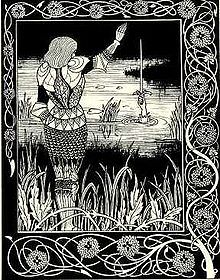Introduction: Throughout the bulk of the Arthurian literary tradition, romancers, novelists, poets, and historians of King Arthur and his Knights have relegated the world’s medieval games to that of the European chessboard. This Eurocentric mentality—that is unfortunately not uncharacteristic of an astounding number of western medievalists— has (un)intentionally participated in the widening of the cultural gaps between Islam and the West. Such an inflexible essentialism might debunk many medievalists’ assumptions of “the uncontested humanism and universalism of the Arthurian tradition. What is meant here is that any liberal humanization of the Arthurian literature from a western critical and cultural standpoint cannot be divorced from what Maria Rosa Menocal aptly labels as “the myth of westerness in medieval literary historiography”. This becomes particularity significant if one, for instance, explores the cultural and literary reception of the Arthurian text in the very land of the “other” of King Arthur and his Knights, that is to say, the lands of the “Saracens”.
Through a comparative reading of the themes of chivalry and courtly love, I will try, in the first part of my paper, to highlight the literary and cultural elements that might attract a Middle Easterner to the Arthurian literature. Setting the example of Sir Thomas Malory’s Morte D’Arthur, I will try in the second part, to interrogate the Arthurian discourse of alterity and explore the polemical representation of Islam so as to unveil some of the literary and cultural elements that might, indeed, make King Arthur feel unwelcome in the lands of the “Saracens”.
Chivalry is indubitably a major source of literary and cultural identification that can make of the Arthurian tradition both readable and enjoyable in the Middle East. In fact, one must not forget that throughout centuries and centuries, both pre-Islamic and Islamic Arabs have hailed the knight and his horse in an almost unequaled way in human history. Both the knight and his horse have been a source of power, pride, poetry, and tribal celebration and romance. The observations of A. F. L. Beetson, renowned for his study of Arabic literature until the Umayyad dynasty, and albeit their Orientalist spice, merit quoting in this regard: “The idea of chivalrous behavior,” Beetson observes “was part of the inter-tribal moral code. The Arabs were great horsemen, as good breeders of horses as they were of camels, and they claim their pedigree horses were descended from the Jin.”
King Arthur in the Lands of the Saracens
By Nizar F. Hermes
Nebula, Vol.4:4 (2007)
Introduction: Throughout the bulk of the Arthurian literary tradition, romancers, novelists, poets, and historians of King Arthur and his Knights have relegated the world’s medieval games to that of the European chessboard. This Eurocentric mentality—that is unfortunately not uncharacteristic of an astounding number of western medievalists— has (un)intentionally participated in the widening of the cultural gaps between Islam and the West. Such an inflexible essentialism might debunk many medievalists’ assumptions of “the uncontested humanism and universalism of the Arthurian tradition. What is meant here is that any liberal humanization of the Arthurian literature from a western critical and cultural standpoint cannot be divorced from what Maria Rosa Menocal aptly labels as “the myth of westerness in medieval literary historiography”. This becomes particularity significant if one, for instance, explores the cultural and literary reception of the Arthurian text in the very land of the “other” of King Arthur and his Knights, that is to say, the lands of the “Saracens”.
Through a comparative reading of the themes of chivalry and courtly love, I will try, in the first part of my paper, to highlight the literary and cultural elements that might attract a Middle Easterner to the Arthurian literature. Setting the example of Sir Thomas Malory’s Morte D’Arthur, I will try in the second part, to interrogate the Arthurian discourse of alterity and explore the polemical representation of Islam so as to unveil some of the literary and cultural elements that might, indeed, make King Arthur feel unwelcome in the lands of the “Saracens”.
Click here to read this article from Nebula
Subscribe to Medievalverse
Related Posts